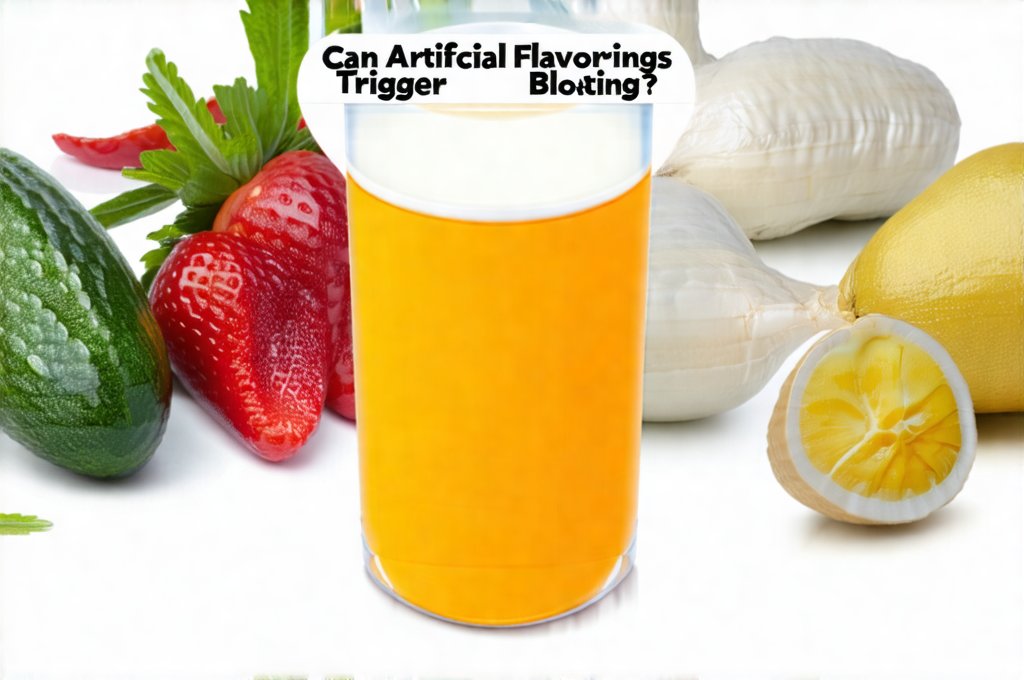Bloating is an incredibly common digestive complaint, affecting millions worldwide. It’s often dismissed as simply “having gas,” but for many, it’s a source of significant discomfort, impacting daily life and even self-confidence. While dietary culprits like beans, broccoli, and carbonated drinks are frequently blamed (and rightly so!), the role of less obvious components in our food – specifically artificial flavorings – is gaining increasing attention. Many individuals are noticing a correlation between consuming foods with these additives and experiencing increased bloating, but understanding why this happens requires delving into both how our digestive systems function and the complex chemistry behind artificial flavors. It’s not necessarily about a direct allergic reaction in most cases; it’s often more nuanced than that, involving gut microbiome disruption, sensitivities, or simply the way these substances are processed by the body. Can emotions trigger physical gut reactions can also play a role in digestive discomfort.
The sheer variety of artificial flavorings used in food production adds to the complexity. These aren’t single compounds, but complex mixtures designed to mimic natural flavors – and sometimes even enhance them beyond what nature provides. From vanillin imitations to synthetic fruit essences, they’re found in an astonishing range of products, from candies and baked goods to processed snacks and beverages. This widespread presence means many people are unknowingly consuming significant amounts of these chemicals daily, potentially contributing to digestive issues that go unexplained for years. Identifying artificial flavorings as a potential trigger requires careful observation, dietary adjustments, and sometimes, the assistance of a healthcare professional to rule out other underlying conditions. How the smell of food can sometimes trigger acid response is another often overlooked factor in digestive distress.
The Science Behind Artificial Flavorings
Artificial flavorings are created through chemical synthesis or extracted from natural sources but then heavily modified. They aim to replicate flavors that either occur naturally in small quantities or don’t exist at all in nature. These compounds, while designed to taste good, aren’t necessarily designed for easy digestion. Many are complex molecules the body struggles to break down efficiently, leading to fermentation by gut bacteria and subsequent gas production – a primary cause of bloating. The specific chemical structure dictates how it interacts with our digestive system; some may be better tolerated than others depending on individual sensitivities.
One major issue is that artificial flavorings often lack the fiber and nutrients present in natural foods. This means they provide little to no bulk, which can affect gut motility – the speed at which food moves through the digestive tract. Slower motility allows more time for fermentation and gas production, exacerbating bloating symptoms. Furthermore, some artificial flavors contain additives like emulsifiers or preservatives that can also disrupt gut health. Emulsifiers, in particular, have been linked to changes in the gut microbiome composition, potentially promoting the growth of unfavorable bacteria and increasing intestinal permeability (often referred to as “leaky gut”). Can dairy products trigger or help acid reflux symptoms? is another question many people ask when trying to understand their digestive issues.
It’s important to remember that regulatory agencies deem these flavorings “safe” for consumption based on current understanding, but safety doesn’t equate to effortless digestion. The amounts used are generally considered safe in terms of acute toxicity, but the cumulative effect of long-term exposure and interaction with individual gut microbiomes is less well understood. This is where personalized sensitivity comes into play – what one person tolerates easily might cause significant bloating in another.
Identifying Problematic Flavorings
Determining which artificial flavorings are most likely to trigger bloating isn’t straightforward, as reactions vary widely. However, certain categories appear more frequently associated with digestive discomfort. – Diacetyl, used to impart a buttery flavor, has been linked not only to bloating but also to lung problems in factory workers exposed to high concentrations, highlighting its potent chemical nature. – Synthetic vanillin, while mimicking the natural vanilla bean extract, often lacks the accompanying compounds that aid digestion and absorption. – Many fruit flavorings utilize esters and aldehydes, which can be difficult for some individuals to process effectively. Do spices always trigger reflux or can they help digestion? is a related question that often arises when considering food sensitivities.
The sheer number of “artificial flavor” listings on food labels is misleading; it’s a catch-all term allowing manufacturers to avoid disclosing specific chemical compositions. This lack of transparency makes pinpointing the culprit extremely challenging. Consumers often rely on elimination diets – removing foods containing artificial flavorings and then systematically reintroducing them – to identify sensitivities. Keeping a detailed food diary, noting both what you eat and any subsequent bloating symptoms, is crucial for this process.
A helpful strategy involves focusing on minimally processed foods as much as possible. The more ingredients a product contains, particularly those listed under the umbrella of “artificial flavor,” the higher the likelihood it may contribute to digestive issues. Looking for products that specifically state “natural flavors” (though even these can be complex) or opting for whole, unprocessed foods are proactive steps toward reducing exposure.
Gut Microbiome Disruption and Flavorings
The gut microbiome – the trillions of bacteria residing in our intestines – plays a vital role in digestion, immunity, and overall health. Artificial flavorings can significantly disrupt this delicate ecosystem. Many artificial flavors are not readily digestible by humans, providing food sources for specific types of bacteria while starving others. This imbalance, known as dysbiosis, can lead to increased gas production, inflammation, and altered gut motility – all contributing to bloating.
Specific flavor compounds may selectively promote the growth of bacteria that produce excessive amounts of hydrogen sulfide, a gas notorious for its unpleasant odor and association with bloating and abdominal discomfort. Furthermore, artificial sweeteners often co-occurring in foods containing artificial flavors can also negatively impact the microbiome, exacerbating these effects. The gut microbiome is highly individual; factors like diet, stress levels, and antibiotic use all influence its composition. Can you be addicted to trigger foods can make dietary changes even more difficult.
Restoring a healthy gut microbiome – through dietary changes (increasing fiber intake, consuming fermented foods), probiotic supplementation (under guidance of a healthcare professional), and stress management – can help mitigate the negative effects of artificial flavorings. It’s not about eliminating them entirely for everyone, but rather understanding their potential impact and taking steps to support optimal gut health.
Practical Steps to Minimize Bloating from Flavorings
Reducing exposure to artificial flavorings requires a conscious effort and a bit of label reading. Here’s a step-by-step approach: – Read labels carefully: Look beyond the “artificial flavor” listing and try to identify specific ingredients if possible. Focus on products with short, recognizable ingredient lists. – Choose whole, unprocessed foods: Fresh fruits, vegetables, lean proteins, and whole grains are naturally free of artificial flavorings. – Cook at home more often: This gives you complete control over the ingredients used in your meals. – Be mindful of seemingly “healthy” options : Even products marketed as healthy (low-fat yogurt, protein bars) can contain hidden artificial flavorings.
Consider an elimination diet: Remove foods containing artificial flavors for a period (2-4 weeks) and then reintroduce them one at a time to identify specific triggers. Keep a detailed food diary to track your symptoms and pinpoint potential culprits. Hydration is also crucial; adequate water intake supports healthy digestion and can help alleviate bloating.
Finally, remember that digestive health is complex. If bloating persists despite dietary changes, consult with a healthcare professional to rule out underlying medical conditions such as irritable bowel syndrome (IBS), lactose intolerance, or celiac disease. Can GERD trigger migraines or headaches? is another condition that can mimic bloating symptoms and should be considered during diagnosis. While artificial flavorings may be a contributing factor for some individuals, they are rarely the sole cause of bloating and should be addressed within a broader context of overall digestive health management. Can GERD trigger feelings of heart palpitations? is another symptom to watch for that may indicate an underlying condition.


















